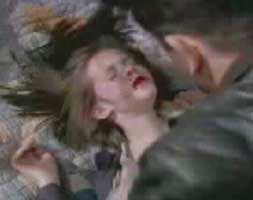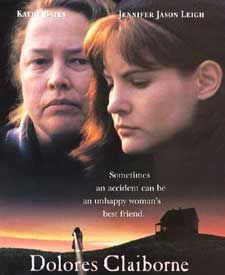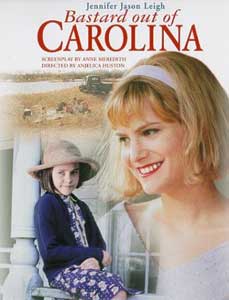I dunno, I was expecting Anjelica Huston, given her lineage, to turn out to be some sort of genius as a director. But Bastard Out of Carolina (1996) has "earnest cable-movie" scrawled all over it.
The subject matter is unpleasant, most of the cast is unpleasant, & the treatment is uneven, too reliant on stereotypes about white trash hillbillies. And it almost seems more a statement about White Trash rather than a statement about child abuse.
Jennifer Jason Leigh as Annie Boatwright is the weakest link in a weak cast, yet of such central importance to the story that her mediocre performance sabotages anyone else's opportunity of coming off well.
 Leigh was given an almost impossible task -- to drum up sympathy for a mother so in love with a pederast (Glen Waddell in a scary performance) against whom she refuses to protect her bastard daughter Bone (Jena Malone). Leigh was given an almost impossible task -- to drum up sympathy for a mother so in love with a pederast (Glen Waddell in a scary performance) against whom she refuses to protect her bastard daughter Bone (Jena Malone).
Even a great actor would've had trouble pulling that off. Leigh is by no means a great actor, & she's had plenty of promising roles to prove her stuff had she had any stuff in her.
The film can still be effectively disturbing because it's about child abuse with a couple brutally graphic sequences tossed in presumedly for realistic grittiness rather than exploitation, though tasteless enough to please the pervs I'd wager.
Even the worst piece of crap movie would be disturbing with this sort of content, & while Bastard is by no means outright crap, it does not rise above mediocrity & relies on its capacity to disgust.
If judged on the depth of pity, sorrow, & horror one can feel for the brave & severely maltreated Bone, then in that limited assessment it's a good film. But it needs to be assessed more broadly than on its ability to convince the viewer of what we already knew, that child abuse & molestation are icky things.
Strangely it starts off as an almost light comic drama that makes white trash hillbillies look like retards. The film has an aggressively "appropriate" selection of music on the soundtrack that ceases to be clever after a while & gets annoying.
Eventually the story turns dark, when Annie falls in love with someone above her class, someone everyone but herself seems to think has something wrong just under his surface charm. He's attracted to her because she has a pretty little girl, & even when she finally knows it, it's her man she is true to, not her offspring.
Christina Ricci is a favorite actor of mine. She turns up in the story very late, & then is never seen again. She's given only one more of the film's stereotyped characters to act out, but contributes nothing specific to the story. I felt a little cheated that I was promised her presence in the film. Lyle Lovett also has an almost invisible role.
Mere cameos from promised performers we'd rather be watching is a dirty trick. So when the film isn't being simply repugnant, it's being disappointing.
[SPOILERS!]  A more effective movie on the same topic is Dolores Claiborne (1995) which once again stars Jennifer Jason Leigh, this time as the daughter of a mother who did eventually protect her daughter from abuse & did so in the most absolute terms. A more effective movie on the same topic is Dolores Claiborne (1995) which once again stars Jennifer Jason Leigh, this time as the daughter of a mother who did eventually protect her daughter from abuse & did so in the most absolute terms.
Perhaps it is partially an upbeat fantasy to see such powerful motherhood protecting its young, as opposed to the all too realistic & recurring fact that lonely deplorable women frequently pretend not to see the obvious. Many will sacrifice their young in order to hold on to a companion, even if he's an evil man.
Leigh for once is adequate to play her role, the angry neurotic emotionally tortured Selena. But the performance that carries the film is that of Kathy Bates as the mom suspected of murder(s).
The entire support cast (David Strathair as the villain of the piece, Judy Parfitt as the overbearing invalid harridan pushing her caretaker Dolores to the edge of endurance until Dolores pushes back, Christopher Plummer as the detective) invariably upraise Bates' performance.
The sensitivity of the film seems hardly what one expects from a Stephen King movie. This is a serious drama, not the least bit a horror film, except that many things of life are horrific in their capacity for inducing long-lasting emotional pain. The bad people of the film are not one-dimensional; they have their own torments. And the comparatively good people of the film most assuredly have their villainous sides.
King's strength as a writer has never been exclusively his feel for the macabre, despite that in film adaptations his sense of the macabre is often all that is left for a script. In his original texts one finds a sincere respect for families & humanity, as well as his understanding of what makes a suspenseful story of character.
When King now & then elects to write a story without the "weird" element, it's often fine stuff, as in the cases of Stand By Me (1986) & Dolores Claiborne. For the latter's film adaptation, King was truly lucky to have one of our finest actors in the titular role.
copyright © by Paghat the Ratgirl
|

 Leigh was given an almost impossible task -- to drum up sympathy for a mother so in love with a pederast (Glen Waddell in a scary performance) against whom she refuses to protect her bastard daughter Bone (Jena Malone).
Leigh was given an almost impossible task -- to drum up sympathy for a mother so in love with a pederast (Glen Waddell in a scary performance) against whom she refuses to protect her bastard daughter Bone (Jena Malone).